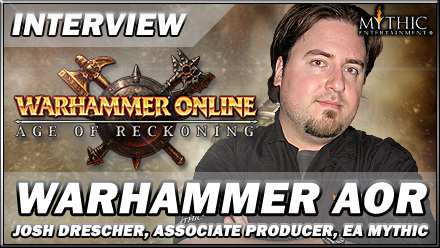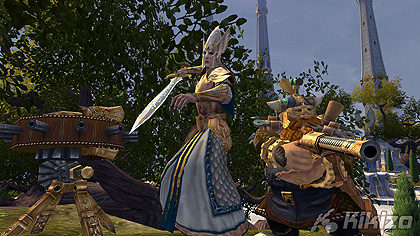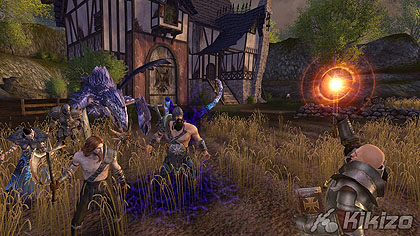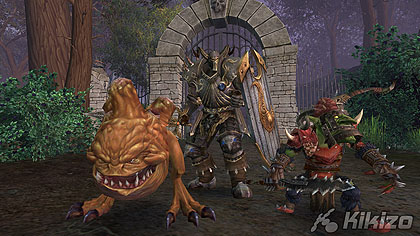Warhammer Age of Reckoning Interview
We stumble our way through a detailed, MMO-flavoured chat with EA Mythic veteran Josh Drescher.

EA Mythic's Warhammer Online: Age of Reckoning opened doors on September 18 and has got off to a flying start, with EA announcing 500,000 subscriptions in the first week of sale. While some critics have described this as a temporary phenomenon, citing that attractive 30 day trial period as an underlying factor, the new MMO's current 91% Metacritic average suggests otherwise.
Associate Producer Josh Drescher is one of the studio's old hands, having joined the company way, way back in 2001 when it was an independent entity, operating under the banner of Mythic Entertainment. Having waylaid Josh's scheduled interviewer en route and stolen her clearance, we were able to pick his brains on such subjects as Orc sex, Byronic elves, what exactly MMOs have to do with football and whether WAR really is the heir to World of Warcraft's throne.
Kikizo: Can you tell us a little about the Warhammer universe to start with?
Drescher: It's a British IP - Games Workshop developed it in the early 1980s, so it's about a quarter of a century old. It's been adapted into novels, graphic novels, comic books, pen and paper role-playing games, different kind of PC games, [but] this is the first time somebody's made an actual MMO out of the IP.
Kikizo: Which is a bit surprising, isn't it, as it appears to be perfectly suited to that kind of play...
Drescher: Well [laughs]... You could say that it's more suited than people know! You'll notice a lot of influence that Warhammer has had on some of the more prestigious MMOs - for example, if you've ever seen a green Orc. Orcs are green because Warhammer Orcs are green, Warhammer Orcs are green because Warhammer Orcs are mushrooms. They are mushrooms because they didn't want to explain how Orcs have sex back in the eighties. So anywhere you've seen a green Orc, that's actually drawn directly from Warhammer. And we're adapting it into an MMO.
Kikizo: Where do you see the MMO going as a genre? What will be the situation 10 years from now?
Drescher: I think the things which have proven to be universal - because there are hundreds of MMOs on the market and they're all variable and different, they offer specific things - I think the social component of it will continue to be a really critical element. I think that's what players have really latched onto, it's what gives a lot of games longevity. We have another game that we oversee called Ultima Online, and it's ten years old...
Kikizo: Wasn't Ultima Online the original MMO?
Drescher: It depends on how far back you're willing to go. I mean technically we can go back into the seventies... and Dungeon, the old MUD, was probably the first one... but Ultima Online was one of the first commercial MMOs, and it's had a static population for over a decade. And that comes from the fact that players feel emotionally connected to that world, to that experience. It's familiar to them, and it represents - for the amount of money that they're actually spending -a lot of return on investment.
For the same amount of money you'd pay for a single ticket to a movie, you can get an entire month of unlimited play in the average MMO. So it's a high value-for-money, high quality experience, very social, it's organic, there's always something for you to do... and we have the ability - unlike with a lot of games - to change our game over time. We can keep adding things to it, we can make modifications to it, improvements - so, literally the game will grow with you over time. So those components are going to remain key. Every now and then you'll see somebody pop up and try to do something really weird and experimental that people get spooked by.
I think that the "amusement park" element of MMOs is also something that's attractive to players. There's a quality of service that they expect now. In the early days you could get away with shipping a half-complete game and saying 'Hey it's the only option, you have to play it', but now players expect Disneyland every time - they expect all the rides to work, they expect everything to be polished and look really great, and so you're going to continue I think to see really epic, high quality games that offer a really excellent quality of service for an extended period of time in a very social or competitive way.
Kikizo: How are your servers holding up? If you end up with a million plus users, what kind of infrastructure will you need to sustain that?
Drescher: It's significant. One of the things you have to balance between is performance and population. You want to make sure that the game feels like it's occupied - that there are lots of players in it - but you also want to make sure the quality of service is there. You don't want to overcrowd Disneyland, or else all the rides become inaccessible.
So you basically build a system where you'll have what we call specific "shards" or servers, and players have the opportunity to create characters on different servers, so you spread out those millions of players across a hundred servers. And you can scale that up and down as that population increases or decreases.
Kikizo: Do you own your servers?
Drescher: It's a little bit different for us because we actually have partners all around the world. So for example Goa owns and controls the European servers, EA owns and controls some of the American servers, we have Asian partners who own and control the Chinese and Korean servers and so forth. And again that has to do with localisation and quality of service.
You want to make sure that when people are playing that game and they need to talk to a gamemaster - that they can talk to someone who speaks their language, understands their culture, understands the questions they're asking and has the ability to access the equipment and fix it if necessary. So it's an international effort with multiple entities controlling different localised systems.
Kikizo: Not something you can do from your bedroom then...
Drescher: Absolutely not!
Kikizo: Do people ever try?
Drescher: People do try - you'll actually see that for most of these games, there'll always be some nefarious specimen who attempts to do a pirated, emulated version of it. It's one of the things that makes us very attractive in markets like Russia and China, where piracy runs up into the 80th or 90th percentile depending on the title - you can't really pirate these games because you need that server infrastructure for the game to work and you need a massive population of players for the game to be engaging.
So especially for a game like ours where you need thousands of players fighting each other, running it on a server in your basement's just never going to work. So we're a very attractive option for some of those emerging markets who have a bit of an underbelly.
Kikizo: Could you give us a quick overview of your game's premise and structure?
Drescher: Have you ever played Dark Age of Camelot? We launched it in 2001, and it was basically a [Player-versus-Player] focussed MMO, but we actually called it Realm versus Realm combat... which is intended to explain our sensibility when it comes to combat, which is that we don't want it to be one player against another player, or a small group of people against another small group of people. We actually had factional combat with entire armies against other armies, and you could actually claim territory in the world, you could claim large fortifications... siege equipment, defences, you could dump boiling oil on people, build catapults and knock down walls and so forth.
So with Warhammer we're adapting that system and expanding on it greatly. So the main focus of the game is between two distinct factions: the forces of Order, the good guys, and the forces of Destruction, the bad guys. And within those two factions we have three contiguous geographical sections of the game, and there's an aggressive pairing of two races within each of those.
So you have Dwarves fighting against Greenskins, High Elves fighting against Dark Elves - High Elves are sort of hoity-toity posh English people who drink tea with their little fingers out, and the Dark Elves are sort of Lord Byron doing a lot of opium, having a lot of sex. Yeah. Then we have the Empire - sort of Germanic, medieval humanity - and Chaos, which is an eighties Heavy Metal rock album gone terribly bad, so think tentacle arms and crab claw arms and crazy spikey things. And basically those individual factions make up the two sides of the game.
And within each of those geographical pairings, you can take over or control territory. At the highest level of the game we have basically four tiers of content, and on the fourth tier - there are two capital cities on either side of the continent, and you can actually move the battlefront back and forth between those cities, and push it all the way to your enemy's capital city. [Then] you can erect siege equipment, knock down gates, go inside and destroy that entire city. So it's a bit of a change from the standard role that capital cities have traditionally played in these games.








 Satoru Iwata Video Interview - the late Nintendo president spoke with Kikizo in 2004 as 'Nintendo Revolution' loomed.
Satoru Iwata Video Interview - the late Nintendo president spoke with Kikizo in 2004 as 'Nintendo Revolution' loomed. Kaz Hirai Video Interview - the first of Kikizo's interviews with the man who went on to become global head of Sony.
Kaz Hirai Video Interview - the first of Kikizo's interviews with the man who went on to become global head of Sony. Ed Fries Video Interview - one of Xbox's founders discusses an epic journey from Excel to Xbox.
Ed Fries Video Interview - one of Xbox's founders discusses an epic journey from Excel to Xbox. Yu Suzuki, the Kikizo Interview - we spend time with one of gaming's most revered creators.
Yu Suzuki, the Kikizo Interview - we spend time with one of gaming's most revered creators. Tetris - The Making of an Icon: Alexey Pajitnov and Henk Rogers reveal the fascinating story behind Tetris
Tetris - The Making of an Icon: Alexey Pajitnov and Henk Rogers reveal the fascinating story behind Tetris Rare founders, Chris and Tim Stamper - their only interview? Genuinely 'rare' sit down with founders of the legendary studio.
Rare founders, Chris and Tim Stamper - their only interview? Genuinely 'rare' sit down with founders of the legendary studio. The History of First-Person Shooters - a retrospective, from Maze War to Modern Warfare
The History of First-Person Shooters - a retrospective, from Maze War to Modern Warfare